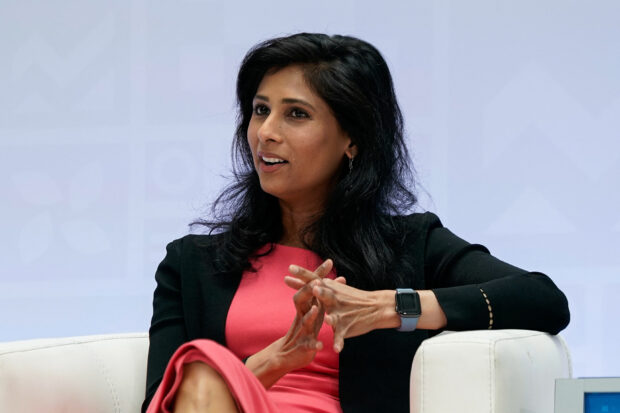FILE PHOTO: Gita Gopinath, the First Deputy Managing Director of the International Monetary Fund (IMF), participated in a panel discussion titled “How Should Central Banks Battle High Inflation?” at the 2023 Spring Meetings of the World Bank Group and the IMF in Washington, D.C. In her speech at the conference, Gopinath highlighted the challenges that emerging markets face and emphasized the need for them to take actions such as rebuilding fiscal buffers, increasing revenues, diversifying trade, and preparing for the significant costs associated with climate change.
Gopinath pointed out that emerging markets are dealing with external conditions that have become more difficult due to geopolitical fragmentation, tough financial circumstances, and the growing expenses caused by climate change. She emphasized that legitimate concerns over supply chain and national security have been raised by the pandemic and Russia’s war in Ukraine. Additionally, Gopinath highlighted the potential long-term costs resulting from extreme weather events due to climate change, especially as debt payments continue to rise steeply. Some studies predict that $2 trillion will be needed annually by 2030 for climate change mitigation.
Using South Africa as an example, Gopinath mentioned that interest payments on public debt are expected to increase significantly, reaching 27% of revenue by fiscal year 2028/29. She also stated that global interest rates are likely to remain high for a long time, and the era of “low for long” may not return due to the possibility of more frequent adverse supply shocks.
Gopinath expressed concern over the increasing fragmentation of global trade, emphasizing that it could lead to a decrease in the gross domestic product (GDP) of most emerging markets, potentially causing losses of around 5% of GDP for South Africa and even higher losses for other countries. Furthermore, she explained that the fragmentation of foreign direct investment could further amplify these costs and be particularly detrimental to emerging markets’ access to advanced technologies and knowledge.
Considering the risks ahead, such as structural rebalancing in China, Gopinath stressed the importance of strengthening monetary policy frameworks and incorporating climate-related financial risks to protect the financial sector. She also highlighted the need for emerging markets to mobilize higher domestic revenues through increased tax collection rates, structural reforms, and diversified trade flows. Gopinath emphasized that adopting a fiscally and socially sustainable climate strategy that includes carbon pricing measures is crucial.
Despite the daunting challenges, Gopinath emphasized the vast opportunities for emerging markets, citing their resilience and potential to accelerate growth and raise living standards. She singled out South Africa as a country with significant potential for a growth take-off due to its natural resources and strong institutions, provided that necessary reforms are implemented to address structural obstacles.
In conclusion, Gopinath conveyed the IMF’s message that emerging markets should take decisive action in response to the difficult circumstances they face, while recognizing and capitalizing on the opportunities that exist.
Denial of responsibility! VigourTimes is an automatic aggregator of Global media. In each content, the hyperlink to the primary source is specified. All trademarks belong to their rightful owners, and all materials to their authors. For any complaint, please reach us at – [email protected]. We will take necessary action within 24 hours.


